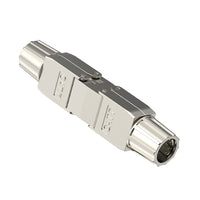What’s the Difference Between Wired and Wireless Network?
Contents [show]
Since the invention of the very first network in the 1960s, the transformative journey of networking has woven itself into the fabric of our daily lives. Over the years, technology has bestowed upon us the wireless network, following the footsteps of wired network.
Some people argue that a wireless network is better than a wired network because it is more modern. But the reality is more nuanced. The wired or wireless network has its own advantages and drawbacks. In some office or home networks, people use both of them. We‘ll dive into the distinctions between wired and wireless networks, offering you a definitive guide to the choices.
What is a Wired or Wireless Network?
As is known, if you want to have access to a network, two connection options are available for you: wired and wireless connection.
Wired Network
A wired network uses an Ethernet cable to connect devices, for example, a computer to an Internet or other network. Ethernet cables are usually available in coaxial cables, copper twisted cables, and fiber optic cables. Copper twisted cables have been commonly used nowadays, but fiber optic cables may replace copper wires in some applications in the future.
Wireless Network
The first commercial wireless network was developed by NCR in 1986 and then it has gradually been widely used in people’s daily life for its convenience. Different from a wired network, a wireless network has no wire and it is usually made up of electromagnetic waves (EM waves) or infrared waves. Antennas or sensors often appear in the wireless network. There are different types of wireless networks such as WLANs (Wireless Local Area Networks) and cell phone networks.
Wired vs Wireless Network
Choosing between a wired or wireless network can be challenging for some people. It is not uncommon for households and enterprises choose to use both wired and wireless Internet. We cannot say that the wireless network is better than wired network as they have their own advantages and disadvantages. Let’s dig out the distinctions between wired and wireless networks in the following article, hope it can help you make a choice.

Wired vs Wireless Speed
When surfing the Internet, you will notice that there is uploading speed and downloading speed, often measured in Mbps and Gbps. In general, a wired network is faster than wireless network, especially in a building that has concrete walls.
Wireless network speed can be affected by many factors. For example, unauthorized users may have the access to the wireless network, which will slow down the network speed. Other electronic devices and wireless connections around your home can also affect your wireless network speed. The exterior interference will cause several problems such as packet loss, high latency, and a conspicuous decline in speed.
Compared to the wireless network, the wired network offers a faster and more stable speed. Behold, a comprehensive network speed chart for your reference, showcasing the performance of commonly used Ethernet cables.
|
Category |
Max. Data Speed |
|
Category 5 |
100 Mbps |
|
Category 5e |
1 Gbps |
|
Category 6 |
1 Gbps |
|
Category 6a |
10 Gbps |
|
Category 7 |
10 Gbps |
|
Category 8 |
25 Gbps / 40 Gbps |
Mobility and Convenience
In terms of mobility and convenience, the wireless network is definitely the winner. The wireless network can cover a large area and you can move freely in this area holding your laptops and other handheld devices. The advent of Wi-Fi has seen an unprecedented surge in popularity, driven by the ubiquity of tablets and mobile phones in recent years.
A wired LAN should use an Ethernet cable to connect computers or other devices, so sometimes it can be inconvenient when you go outside.
Wired vs Wireless Network Security
Many people pay attention to their privacy and they are concerned about the security of the network. So, is a wired network more secure than a wireless network? The answer is yes. The security of a wired network usually relies on the firewall in the router so that the data can be safely transmitted through the Ethernet cable. A wireless network transmits data in the air and it is visible to everyone. So, your private information may be easily compromised by a thief. But you can use secure passwords to avoid most risks.
Installation and Cost
The installation of a wireless network can be easier than that of a wired network as it does not require much cabling. The cost of a wireless network can be affected by the space of the installation. Wired network installation takes a bit long time and if you don't know much about cabling, you need to spend much time on installing cables. What's more, upgrading the network can be a huge project. But the hardware needed for the wired network often has a longer service life.

Ethernet vs Wi-Fi: Which to Choose for Gaming?
Wi-Fi is a wireless network based on IEEE 802.11, which is often used in LAN and Internet access. Wi-Fi is the most common network in the world and you can see Wi-Fi access points in many public places including libraries, cafés, and restaurants. Wi-Fi speed has been improved in recent years. With the oncoming of WiFi 7, some people may think that Ethernet can be replaced by WiFi. That’s not the case and Ethernet can still be the best choice for PC games such as PUBG and Fortnite.
Latency is very important for online gaming, which refers to the time delay it takes for data to travel from a device to its destination. Low latency results in quick information sending and receiving, which allows for a good connection for your gaming. While high latency may even cause lag that can totally impact your gaming. Latency is measured by ping and the ideal ping is less than 100ms.
You can run a ping test to compare the latency of Ethernet and Wi-Fi networks and you will get the conclusion that the Ethernet network usually has a low latency than Wi-Fi. But if you have an expensive modem, router, and other hardware for your computer, Wi-Fi can also perform as well as Ethernet.

Final Thoughts
These two types of connections are no better than each other, both wireless and wired networks are great for specific uses. A well-rounded home or office network usually has both of them. If you're regularly flitting between your mobile phone, laptop, and tablet, the wireless network is a seamless choice. For everyday uses like streaming videos, music, and web surfing, wireless connectivity provides enough support.
But if you have a higher requirement for gaming experience and streaming media, you may benefit more from the wired network.
For more information on this topic, you can keep up on our blogs. While VCELINK offers general and basic information for our customers and other visitors to the website, it’s not professional advice.






COMMENTS